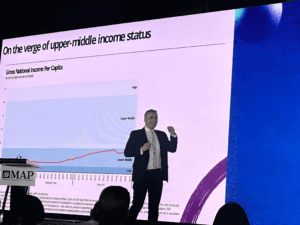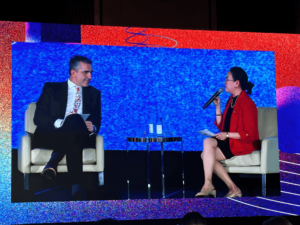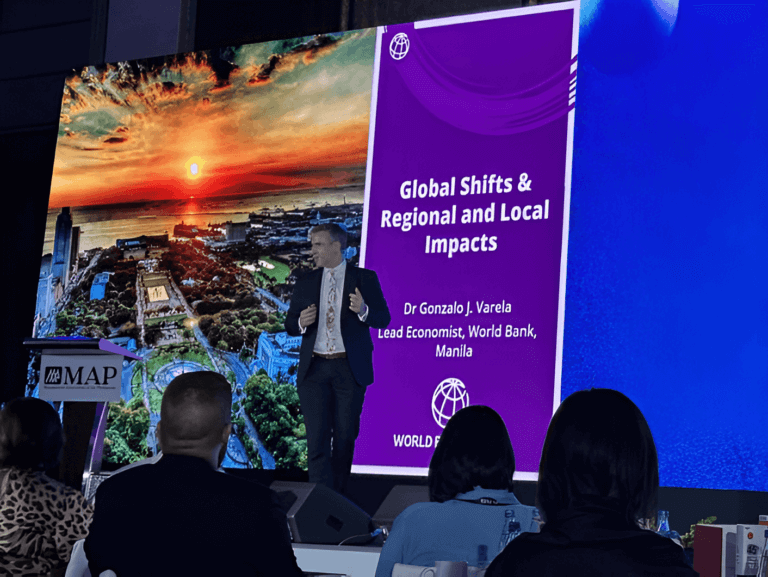The global economy is undergoing significant transformations, and the Philippines is right in the middle of these changes. In his recent talk during the Management Association of the Philippines’ 22nd International CEO Conference on September 10, 2024, Dr. Gonzalo Varela, Lead Economist and Program Leader at the World Bank, discussed the evolving economic landscape, focusing on global shifts and their regional and local impacts. His insights provide a roadmap for understanding the challenges and opportunities ahead for the Philippines.
Income Growth and the Middle-Income Trap
Over the past decade, the Philippines has made notable progress in increasing its average income. From 2009 to 2023, average incomes in the country nearly doubled, growing from 18% to 30%. While this is a significant achievement, the Philippines still has a long way to go to reach the income levels of high-income countries. The nation stands on the cusp of achieving solid middle-income status, working to close the gap with its ASEAN neighbors.
What stands out in this income growth story is that the poorest segments of the population have seen their incomes rise faster than those of wealthier families. This means that economic gains have been more impactful for those who need them most. Conversely, income growth for high-income families has been relatively slower. This trend is mirrored in the business sector, where median and lagging firms have started catching up with leading firms. However, for sustained economic momentum, the leading firms must accelerate their growth even further.

Regional Growth Disparities
Economic growth across the Philippines has been relatively balanced, but regional disparities remain. For instance, the Bangsamoro Autonomous Region in Muslim Mindanao (BARMM) is significantly less productive—about one-sixth as productive as the National Capital Region (NCR). Despite this disparity, lower-income regions like BARMM have experienced higher growth rates, indicating a slow but steady catch-up process.
This disparity in growth highlights the importance of resource allocation in the economy. In the Philippines, more productive firms are receiving more resources—capital, machinery, and investment—while the least productive firms are releasing theirs. This raises a critical question: Are resources being used efficiently? While some sectors show promise, overall growth has been described as “perspiration-driven,” relying heavily on labor and investment rather than innovation or intellectual development.
The Need for Knowledge-Driven Growth
Following the global financial crisis, the Philippines’ growth has predominantly been driven by investment and labor. However, for the country to transition to a higher stage of development, there needs to be a shift towards knowledge-driven growth. This requires investment in education, skills development, and fostering industries that complement advanced technologies like artificial intelligence.
One key observation is that wealthier countries implement robust industrial strategies to drive income growth. These policies help foster innovation, support high-value industries, and create a skilled workforce. Unfortunately, the Philippines has not fully leveraged such industrial policies, limiting its growth potential.
Moreover, the issue of informal workers remains a significant challenge. Many workers are still stuck in conditions akin to “modern slavery,” underscoring the need for policies that promote formal employment and protect workers’ rights.
Opportunities from Global Decoupling from China
A global trend that presents both challenges and opportunities is the decoupling from China. While this shift has created difficulties for China, it opens up new avenues for countries like the Philippines to attract foreign investments. As companies seek alternative destinations for investment, the Philippines must showcase its talent and capacity to handle high-value activities. For instance, Dyson’s decision to set up a research and development center in Batangas indicates the potential for the country to attract more R&D investments.
However, certain policies, such as the Corporate Recovery and Tax Incentives for Enterprises (CREATE) Act, have made it harder for the Philippines to attract foreign direct investment (FDI) compared to other ASEAN countries. To capitalize on the global shift, the Philippines must refine its policy agenda and make itself more attractive to global investors.

Sustaining Growth Momentum: The Way Forward
To sustain its growth momentum and move closer to high-income status, the Philippines must focus on several key areas. First, there is a need to enhance skills development, especially in fields that can be augmented by AI and other advanced technologies. Second, the country should consider adopting more targeted industrial strategies to drive innovation and create high-value jobs. Third, ensuring efficient resource allocation and creating an inclusive economy where all regions and populations benefit is critical.
Furthermore, as global dynamics change and countries decouple from China, the Philippines has a unique opportunity to position itself as a competitive alternative in the global market. Understanding and adapting to global shifts will be essential in this effort, as it will require a concerted approach to attract investments, develop local talent, and foster a conducive environment for innovation and growth. By effectively navigating these global shifts, the Philippines can capitalize on emerging trends and enhance its economic resilience.
In summary, while the Philippines has made significant strides in recent years, it faces a crucial juncture in its economic development. By addressing these challenges and seizing new opportunities, the country can continue to grow, catch up with its neighbors, and provide a better future for all its citizens.
Stay Ahead of the Curve
Are you eager to explore timely and relevant topics that shape our world? The John Clements Leadership Institute offers programs that discuss important themes like global shifts and their impacts. Join us to enhance your knowledge and skills, equipping you to thrive in today’s dynamic environment!





